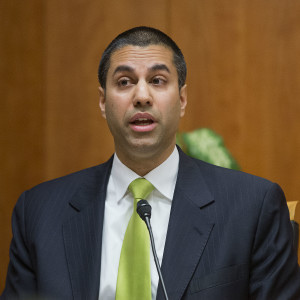Did Russia “steal” the net neutrality debate, too?
The New York Times is suing the Federal Communications Commission (FCC) for withholding documents and “hiding evidence” of what they claim is Russian interference into the policy decision to repeal its so-called “net neutrality” policy. The newspaper believes Russian meddling interfered with the proceedings and they want the FCC to hand over the documentation that might prove it.
But the idea that Russians interfered with the FCC’s decision to repeal net neutrality reveals a severe lack of understanding regarding how the FCC makes rules.
The Times is seeking documents relating to the crash of the FCC’s public comment system in May 2017 when John Oliver of the Last Week Tonight show encouraged Americans to submit comments supporting net neutrality days before the FCC voted to repeal net neutrality rules.
At the time, the FCC claimed the crash was a cyber attack, but a recent Office of the Inspector General report found that there was “insufficient evidence” to call the crash a cyber attack.
The Times’ obsession with the May 2017 crash hinges on the belief that those public comments could have influenced the FCC’s decision to repeal net neutrality.
According to the complaint filed with the United States Southern District Court of New York, “The request at issue in this litigation involves records that will shed light on the extent to which Russian nationals and agents of the Russian government have interfered with the agency notice-and-comment process about a topic of extensive public interest: the government’s decision to abandon ‘net neutrality.’ Release of these records will help broaden the public’s understanding of the scope of Russian interference in the American democratic system.”
Numerous tech publications take a similar view. Gizmodo has published multiple stories slamming the FCC for “spreading lies” about the May 2017 crash in order to cover up whatever actually happened. The Verge ran story headlined “The FCC lied to Congress about an alleged cyberattack and didn’t come clean until now,” and ArsTechnica ran a similar story.
Fight for the Future, a nonprofit advocacy group fighting for net neutrality, accused the FCC of covering up “what really happened” with the May 2017 crash in order to stop net neutrality supporters from commenting on the rule change.
These groups all supported the now-repealed net neutrality rules. They believe that the FCC lied about the crash to cover up the fact that they somehow didn’t allow net neutrality supporters to comment. This muted the potential public outrage over the FCC’s upcoming vote to repeal net neutrality, and the lack of public comment–or, perhaps more accurately, public backlash– allowed the FCC to repeal this popular policy.
The problem with this narrative is that, while the FCC “gives the public notice that it is considering adopting or modifying rules on a particular subject and seeks the public’s comment,” it does not rely on those comments to make a rule change.
In other words, the FCC’s authority does not come from the public, it comes from Congress, which has given the FCC authority to make legislative rules regarding its area of jurisdiction. Even rules that activists and cable TV news hosts support.
The FCC is required to allow the public to comment on a rule (unless its an emergency, in which the public comment period may be waved, again showing that the FCC does not rely on comments to make decisions), but the FCC’s own website states that “while anyone may comment, our ultimate decision has to be reasonable pursuant to the Administrative Procedure Act; we have to provide a basis for our decision and show how our rule will achieve its purpose.”
Furthermore, the Trump administration’s Republican-led FCC had been saying for months that it was going to repeal net neutrality rules. Public outrage wasn’t going to change that.
As early as 2014, then-Commissioner Ajit Pai said it was not the FCC’s authority to enforce net neutrality rules. In December 2016, just a month before President Trump tapped him to become FCC chairman, Pai said net neutrality’s days were “numbered.”
Pai did tell the Senate Commerce Committee at an oversight hearing in August that when the public comment system crashed in May 2017, it was “flooded” with “half a million” comments from Russia.
If Pai’s claim is to be believed — if Russians did contribute to the FCC’s public comment system crash — that still doesn’t mean it interfered with the FCC’s decision to repeal net neutrality rule in any way.
The FCC told ArsTechnica that it would not release records of what happened to the Times for security reasons. According to the FCC’s statement, a judge for the United States District Court for the District of Columbia told the FCC it “need not” turn over the documents to the Times.

